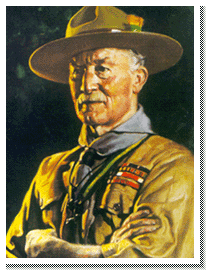Baden-Powell
Youth Period
Robert Stephenson Smyth Baden-Powell, known as B.-P., was born in London on 22nd February 1857. His father, Reverend Baden-Powell, a Professor at Oxford University died when B.-P. was only three years old. B.-P. was the 6th son and the 8th of 10 children of his father. He studied at Charterhouse School where he began to exploit his interest in the arts of Scouting and woodcraft. He and his brothers were always in search of adventure. He spent his holidays camping, hiking and sailing. In all this, B.-P. was learning tent pitching, map and compass use, and wood-fire cooking.
Army Period
B.-P.'s academic result at school was not very outstanding. But he had excellent performance in the open examination for the Army and was commissioned straight into the 13th Hussars, bypassing the officer training. He served in India, Afghanistan and South Africa with the 13th Hussars.
In 1897, he was promoted to command the 5th Dragon Guards. B.-P. firstly introduced Scouting training in the 5th Dragon Guards and gave badges to award the soldiers when they achieved certain standards.
In 1899, he helped defend Mafeking during its 217-day siege in Boer War in South Africa. By using the local boys as messengers in the corps during the siege, he was strongly impressed the courage and resourcefulness of the boys. The siege of Mafeking ended on 17th May 1900. He became a national hero for his success in the defending.
During the 217-day siege, B.-P.'s book 'Aids to Scouting' was published and became very popular. When he returned to England as Inspector General of Cavalry, it was found that the book was widely used by youth leaders and teachers in the country.
Scouting Period
In 1907, he led a groups of 20 youths plus his nephew and an older brother of the boys on camp to Brownsea Island, Poole, Dorset to have an experimental camp in order to test his ideas in practice. In 1908, his another book 'Scouting for Boys' was published. It was regarded as training aid for many organisations. Boys also tried the ideas by forming themselves into Scout Patrols. Scouting gradually became a worldwide Movement. 'Scouting for Boys' has been translated into many different languages and dialects. He had established an office to handle the large number of enquiries concerning the Movement in 1908. With the advice of His Majesty King Edward VII, B.-P. retired from the Army in 1910 and fully concentrated in the Scout Movement.
He was enthusiastic in the development of Scouting and also its sister Movement, Guiding. He traveled all over the world in order to encourage the growth of the Movements. In 1912, he married Olave Soames who was very helpful in all his work.
In 1920, B.-P. was acclaimed as Chief Scout of the World in the 1st international Scout Jamboree took place at Olympia, London.
In 1929, at the 3rd World Jamboree held in Arrowe Park, to celebrate the 21st Anniversary of the publication of "Scouting for Boys", he took the title of Lord Baden-Powell of Gilwell and Gilwell Park became the International Training Centre for Scout Leaders.
In 1938, he returned to Africa for his semi-retired life in Nyeri, Kenya because of his ill health. He died on January 8, 1941 at the age of 83.
